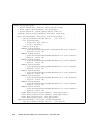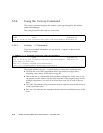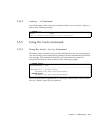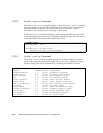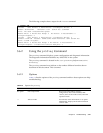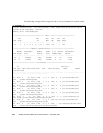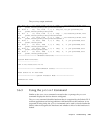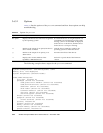
Chapter 3 Troubleshooting 3-19
3.5.6 Using the fmstat Command
The fmstat command reports statistical information and a set of modules that are
associated with the module called Solaris Fault Manager. By using the fmstat
command, statistical information about the diagnostic engine and diagnostic agent
that are currently involved in fault management can be displayed.
The following output example shows that the fmd-self-diagnosis DE module
(displayed also on the console output) has received accepted events.
3.6 General Solaris Troubleshooting
Commands
Superuser commands of this type are useful to determine whether there is a problem
with the server, network, or another server connected via the network.
This section explains the following commands:
■ “Using the iostat Command” on page 3-20
■ “Using the prtdiag Command” on page 3-21
■ “Using the prtconf Command” on page 3-23
■ “Using the netstat Command” on page 3-26
■ “Using the ping Command” on page 3-27
■ “Using the ps Command” on page 3-28
■ “Using the prstat Command” on page 3-29
# fmstat
module ev_recv ev_acpt wait svc_t %w %b open solve memsz bufsz
cpumem-diagnosis 0 0 0.0 0.0 0 0 0 0 3.0K 0
cpumem-retire 0 0 0.0 0.0 0 0 0 0 0 0
disk-transport 0 0 0.0 1793.8 0 0 0 0 40b 0
eft 0 0 0.0 0.0 0 0 0 0 1.2M 0
event-transport 0 0 0.0 0.0 0 0 0 0 210b 0
fabric-xlate 0 0 0.0 0.0 0 0 0 0 0 0
fmd-self-diagnosis 0 0 0.0 0.0 0 0 0 0 0 0
io-retire 0 0 0.0 0.0 0 0 0 0 0 0
snmp-trapgen 0 0 0.0 0.0 0 0 0 0 32b 0
sysevent-transport 0 0 0.0 2395.3 0 0 0 0 0 0
syslog-msgs 0 0 0.0 0.0 0 0 0 0 0 0
zfs-diagnosis 0 0 0.0 0.0 0 0 0 0 0 0
zfs-retire 0 0 0.0 0.0 0 0 0 0 0 0




